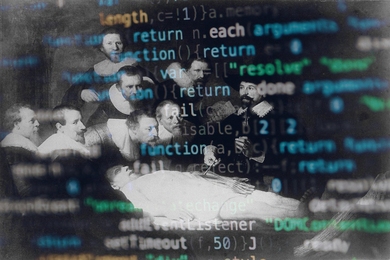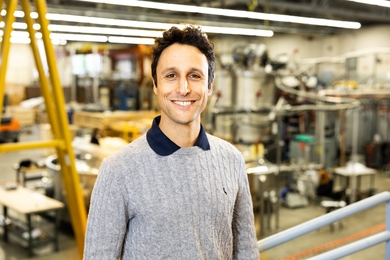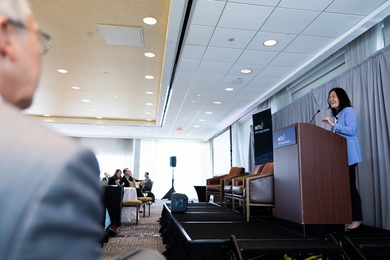Faculty members approved an undergraduate communications requirement and a new Master of Engineering in Logistics degree at the April 16 meeting.
Recalling the March meeting's lively exchange among faculty about the wording of the motion for the communications requirement, Professor Lawrence S. Bacow of urban studies and planning, chair of the faculty, said he had accepted Professor David Thorburn's "friendly amendment" to the motion, noting all changes since then were "merely editorial" and done for "economy of language."
In the motion, which was proposed by Professor Bacow, the faculty directs the Committee on Undergraduate Programs (CUP) to "conduct a series of experiments and pilot programs" to design a new communication requirement by the spring of 2000. The National Science Foundation has already committed $200,000 to CUP for its research.
Rosalind H. Williams, dean for undergraduate education, opened a brief but spirited round of "real-time editing," and the final version of the motion was passed by unanimous voice vote.
The action arose from a report by the Special Committee on the Writing Requirement that 25-30 percent of juniors surveyed in a six-month study had inadequate writing skills. Another third were shown to have only marginal abilities. All had passed Phase One of the communications requirement established in 1982.
MASTER OF LOGISTICS
Professor Ian Hutchinson of nuclear engineering stirred debate on the motion to establish a Master of Engineering in Logistics by declaring at the outset that he would "vote against it, because it gives to an interdisciplinary center (the Center for Transportation Studies) greater freedom in granting degrees than we do to a single department. This could lead to proliferation of titles and to turf battles."
Professor Hutchinson cited precedents, including one related to the Department of Ocean Engineering, in which similar requests had been turned down. He moved that the motion be tabled until a "properly considered policy on master of engineering degrees" is in place. "Academic departments and schools are the heart of educational structure here," he said.
Professor Bacow acknowledged that precedents showed an "intent to limit interdisciplinary degrees" but added, "Now we know how to do it." Professor Yossi Sheffi, director of the Center for Transportation Studies, added, "Registration procedures are already in place."
"There is something bizarre, on-the-fly about trying to expedite a particular proposal rather than consider policy," Professor Hutchinson responded. Agreeing with him, Professor Leigh H. Royden of earth, atmospheric and planetary sciences suggested the faculty "temporarily change the name of the degree to a Master of Engineering in Transportation Studies," as the Center was already established.
"Let's change the name of the Center instead, to the Center for Engineering Logistics," responded Professor Sheffi. "Transportation is old, passe. Logistics is much more marketable. We have publicity ready to go, articles are in professional journals. don't delay!"
Professor Hutchinson's motion to table discussion was defeated, 33-13, and the original motion establishing a Master of Engineering in Logistics was passed.
In other business, a slate of nominees for standing committees was presented, as well as three separate motions to change certain faculty regulations. These items will be voted on at the May meeting. For a full list of the committee nominees and the proposed regulation changes, click on "Enclosures" on the on-line meeting agenda at
A version of this article appeared in MIT Tech Talk on April 30, 1997.




